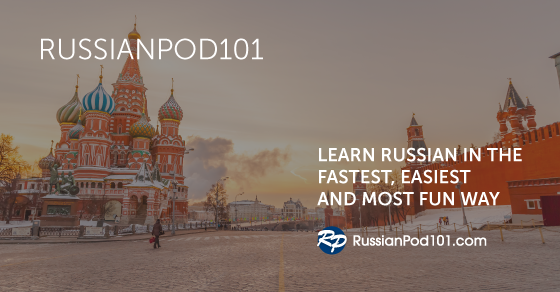برچسب: use
-

How to Use Parting Phrases and Expressions
Welcome to Can-Do Russian by RussianPod101.com. In this lesson, you’ll learn how to use parting expressions in Russian. For example, “Goodnight” is Спокойной ночи. (Spokoynoy nochi.) Marina Maslova is talking with her former colleague, Rose Reznikova . As Marina says goodbye, her children join her in saying goodnight. Before you hear their conversation, let’s preview some of its key components. До скорого! (Do skorogo!) “See you soon!” До скорого! До скорого! Спокойной ночи. (Spokoynoy nochi.) “Goodnight” Спокойной ночи. Спокойной ночи. Доброй ночи! (Dobroy nochi!) “Goodnight” Доброй ночи! Доброй ночи! До встречи. Пока! (Do vstrechi. Poka!) “See you. Bye!” До встречи. Пока! До встречи. Пока! Focus on the way each person says goodbye. До скорого! (Do skorogo!) Спокойной ночи. (Spokoynoy nochi.) Доброй ночи! (Dobroy nochi!) До встречи. Пока! (Do vstrechi. Poka!) Once more with the English translation. До скорого! (Do skorogo!) “See you soon!” Спокойной ночи. (Spokoynoy nochi.) “Goodnight.” Доброй ночи! (Dobroy nochi!) “Goodnight!” До встречи. Пока! (Do vstrechi. Poka!) “See you. Bye!” Let’s break down each of these expressions. First, do you remember how Milena says, “See you soon!” До скорого! (Do skorogo!) This starts with до (do), meaning “until.” До . До. Next is скорого (skorogo), meaning something like “upcoming,” in this context. Скорого . Скорого. Note скорого (skorogo) is from скорый (skoryy), meaning “upcoming.” Скорый (Skoryy). Together, до скорого (do skorogo) means something like “until the upcoming,” but translates as “See you soon.” До скорого! (Do skorogo!) Note, до скорого (do skorogo) is a shortened form of the expression до скорого свидания (do skorogo svidaniya) literally “until upcoming appointment,” but translates as “until the coming appointment.” До скорого свидания (Do skorogo svidaniya). When using this expression, свидание (svidaniye), “appointment,” is usually omitted. До скорого! (Do skorogo!) До скорого (Do skorogo) is fairly informal, which indicates a close relationship between Milena and Rose Reznikova , her former colleague. Do you remember how Marina says, “Goodnight.” Спокойной ночи. (Spokoynoy nochi.) “Goodnight.” Спокойной ночи. Спокойной ночи (Spokoynoy nochi), literally means “[have a] restful night.” Спокойной ночи . Спокойной ночи. (Spokoynoy nochi.) And do you remember how Mikhail says, “Goodnight.” Доброй ночи! (Dobroy nochi!) “Goodnight!” Доброй ночи! Доброй ночи (Dobroy nochi), literally “[have a] Goodnight,” but it translates as “Goodnight.” Доброй ночи! Both expressions used by Marina and Mikhail are used to say goodnight to Rose. You use спокойной ночи (spokoynoy nochi), “Goodnight,” when you don’t plan on seeing someone again that night, and when someone is about to go to bed. It’s like saying “have a goodnight’s sleep.” It’s very informal, and rather used with people you are close to. Do you remember how Rose says? “See you. Bye!” До встречи. Пока! (Do vstrechi. Poka!) “See you. Bye!” До встречи. Пока! First is до встречи (do vstrechi), “See you.” До встречи. This starts with до (do), which means “until” in this context. До . До. After this is встречи (vstrechi), “meeting.” Встречи . Встречи. Together, До встречи (Do vstrechi), literally “until meeting [you again],” but translates as “See you.” Note: До встречи (Do vstrechi) is an informal parting greeting, and you should avoid it in a formal situation. Next is пока (poka), “bye.” Пока . Пока. All together, До встречи. Пока! (Do vstrechi. Poka!) “See you. Bye!” До встречи. Пока! (Do vstrechi. Poka!) This sentence is informal. Rose uses this to say goodbye to everyone. She’s the most senior person in the conversation, and she uses informal language to sound friendly. The following expressions are used when you expect to see the person, or people, again in the near future, such as this week or the following week: До встречи (Do vstrechi), “See you.” До скорой встречи (Do skoroy vstrechi), “See you soon.” Увидимся (Uvidimsya), “See you.” When parting, it’s not unusual for speakers to add an additional good-bye phrase to their parting greeting. For example, Всего доброго (Vsego dobrogo) or Всего хорошего (Vsego khoroshego), literally “all of good,” but it translates as “all the best.” Бывай здоров(а) (Byvay zdorov(a)), literally, “be healthy,” but it translates as “take care.” Note: Бывай здоров, is kind of old-fashioned, and it’s often shortened to бывай (byvay). There is an interesting Russian expression worth mentioning: Прощай (Proshchay), meaning “farewell.” You use this phrase when you do not expect to see someone ever again. In colloquial language, Russians often add давай (davay) to good-bye phrases. For example, Давай, пока (Davay, poka). “Bye.” Давай, пока . Literally, давай is a command meaning “give.” Adding давай (davay) does not change the meaning of the greeting. Let’s look at some examples. Listen and repeat or speak along with the native speaker. До скорого! (Do skorogo!) “See you soon!” До скорого! (Do skorogo!) Спокойной ночи. (Spokoynoy nochi.) “Goodnight.” Спокойной ночи. (Spokoynoy nochi.) До встречи. (Do vstrechi.) “See you.” До встречи. (Do vstrechi.) Пока! (Poka!) “Bye!” Пока! (Poka!) Доброй ночи! (Dobroy nochi.) “Goodnight!” Доброй ночи! (Dobroy nochi.) До свидания. (Do svidaniya.) “Goodbye.” До свидания. (Do svidaniya.) Did you notice the last parting expression? До свидания. (Do svidaniya.) “Goodbye.” This starts with до (do), “until” in this context. До. Next is свидания (svidaniya). “Appointment.” Свидания . Свидания. Together it’s до свидания (Do svidaniya), “goodbye.” До свидания.. До свидания. You can use this greeting in all situations, no matter if you plan to meet the person again or not. It can be used in formal and informal situations. До свидания (Do svidaniya). Let’s review. Respond to the prompts by speaking aloud. Then repeat after the native speaker, focusing on pronunciation. Ready? Do you remember how to say, “See you soon!” До скорого! (Do skorogo!) До скорого! (Do skorogo!) And how Marina says, “Goodnight.” Спокойной ночи. (Spokoynoy nochi.) Спокойной ночи. (Spokoynoy nochi.) Do you remember how Mikhail says, “Goodnight.” Доброй ночи. (Dobroy nochi.) Доброй ночи. (Dobroy nochi.) Do you remember how to say, “See you.” До встречи. (Do vstrechi.) До встречи. (Do vstrechi.) And how to say, “Bye!” Пока! (Poka!) Пока! (Poka!) Do you remember how to say, “See you. Bye!” До встречи. Пока! (Do vstrechi. Poka!) До встречи. Пока! (Do vstrechi. Poka!) Let’s practice. Imagine you’re Miroslav Maslov , and you’re talking with Rose Reznikova . Respond by saying “Goodnight.” Ready? До встречи. Пока! (Do vstrechi. Poka!) Спокойной ночи. (Spokoynoy nochi.) Listen again and repeat. Спокойной ночи. (Spokoynoy nochi.) Спокойной ночи. (Spokoynoy nochi.) Let’s try another. Imagine you’re Mikhail Maslov , and you’re finishing class. Respond by saying “Bye!” Ready? Пока. (Poka.) Пока! (Poka!) Listen again and repeat. Пока! (Poka!) Пока! (Poka!) Let’s try one more. Imagine you’re Marina Maslova , and you’re finishing coffee with your college friend, Natalia . Respond by saying “See you.” Ready? До скорого! (Do skorogo!) До встречи. (Do vstrechi.) Listen again and repeat. До встречи. (Do vstrechi.) До встречи. (Do vstrechi.) In this lesson, you learned how to use basic parting greetings in Russian. This plays an essential role in the larger skill of using basic greetings. Let’s review. Do you remember the polite way to say “Hello?” Здравствуйте (Zdravstvuyte) Здравствуйте (Zdravstvuyte) Do you remember how to say, “Good evening?” Добрый вечер. (Dobryy vecher.) Добрый вечер. (Dobryy vecher.) Imagine you’re Marina Maslova , and you’re meeting your friend Natalia Ivanova in the morning, after a short small talk you part your ways. Do you remember the informal way to say “Hello?” Привет! (Privet!) Привет! (Privet!) Respond to your friend Natalia greeting you first. Привет! (Privet!) Привет! (Privet!) Listen again, and repeat. Привет! (Privet!) Привет! (Privet!) And do you remember how to say “Bye?” Пока! (Poka!) Пока! (Poka!) Respond to Natalia Ivanova . Пока. (Poka.) Пока! (Poka!) Listen again, and repeat. Пока! (Poka!) Пока! (Poka!) Well done! This is the end of the lesson and the Can Use Basic Greetings unit of this course. Remember, these Can Do lessons are about learning practical language skills. What’s next? Show us what you can do. When you’re ready, take your assessment. You can take it again and again, so try anytime you like. Our teachers will assess it, and give you your results. Keep practicing — and move on to the next lesson! -

More ways to use ‘sério’ in Portuguese
Ei, gente! Prontos para o fim de semana? Mas agora é hora de falar sério! But now it’s time to get serious and move on with our previous post about the word sério in Portuguese. Today we are going to cover a few more idioms and examples related to this very interesting term in our language. Vem dar uma olhada!

Por que você está tão séria? (Photo by Karolina Grabowska)
Brazilians are usually very friendly and like to smile. So if you’re not really in a cheerful mood as we so often are, you will likely hear this phrase.
And as a bonus treat for learners, here is a classic song from the 2000s featuring Brazilian popular rap group Charlie Brown Jr. and R&B singer Negra Li, Não É Sério, so you can boost your language skills as you sing: